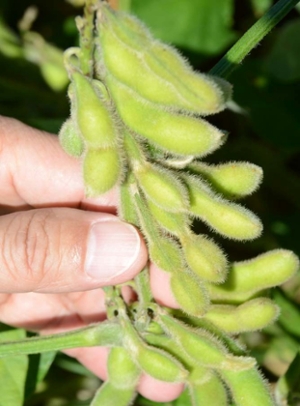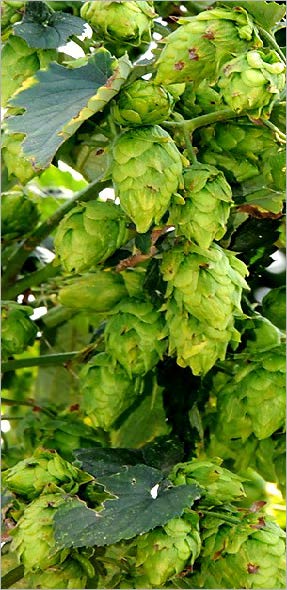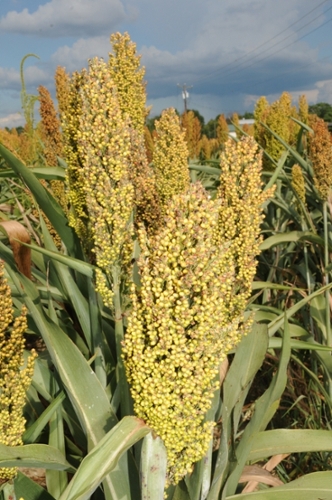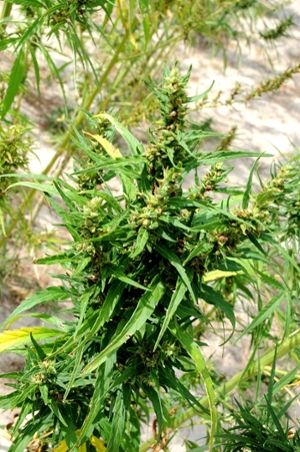Specialty Crops
 The ARS has a well-established vegetable soybean/edamame research program, exploring its potential as an alternative cash crop for former tobacco farmers in Virginia. Researchers have developed three cultivars that are suited to growing conditions in Southside Virginia and have worked with farmers in the region to test these varieties. Marketing edamame is a challenge because of its short harvest window and shelf life; for this reason, ARS scientists have focused recent efforts on extending the harvest period by identifying varieties that can be grown in multiple seasons.
The ARS has a well-established vegetable soybean/edamame research program, exploring its potential as an alternative cash crop for former tobacco farmers in Virginia. Researchers have developed three cultivars that are suited to growing conditions in Southside Virginia and have worked with farmers in the region to test these varieties. Marketing edamame is a challenge because of its short harvest window and shelf life; for this reason, ARS scientists have focused recent efforts on extending the harvest period by identifying varieties that can be grown in multiple seasons.
 In response to a growing craft beer industry and an increase in consumer demand for local products, ARS scientists are currently researching the growth of hops (Humulus lupulus.) and other malt grains to be used in locally brewed beer. The Virginia Department of Agriculture and Consumer Services (VDACS) provided funds in 2015 for Specialty Crops scientists to construct a hops yard. Trials are being run to explore the nutrient needs of locally grown hops and to identify varieties that show resistance to the pests and diseases found in Virginia’s humid climate. Researchers also work with local producers to outline their needs in regards to the harvest and processing of hops on a small scale.
In response to a growing craft beer industry and an increase in consumer demand for local products, ARS scientists are currently researching the growth of hops (Humulus lupulus.) and other malt grains to be used in locally brewed beer. The Virginia Department of Agriculture and Consumer Services (VDACS) provided funds in 2015 for Specialty Crops scientists to construct a hops yard. Trials are being run to explore the nutrient needs of locally grown hops and to identify varieties that show resistance to the pests and diseases found in Virginia’s humid climate. Researchers also work with local producers to outline their needs in regards to the harvest and processing of hops on a small scale.
 Sorghum has the potential to be a valuable specialty crop for Virginia, in both its grain and sweet forms. Grain sorghum is used primarily for feed, and sweet varieties are grown for juice, which can be processed into syrup, spirits, or bioethanol. Because it needs less water and fertilizer than crops like corn, sorghum is less expensive to grow, making it an appealing option for local farmers.
Sorghum has the potential to be a valuable specialty crop for Virginia, in both its grain and sweet forms. Grain sorghum is used primarily for feed, and sweet varieties are grown for juice, which can be processed into syrup, spirits, or bioethanol. Because it needs less water and fertilizer than crops like corn, sorghum is less expensive to grow, making it an appealing option for local farmers.
 In 2015, the Commonwealth of Virginia authorized institutions of higher education to grow industrial hemp for research purposes, opening the door for the ARS to investigate the production of this versatile crop. With practically every part of the plant being usable, industrial hemp is harvested for fiber, seed, seed meal, and seed oil. Virginia has joined thirteen other states to establish an industrial hemp program aimed at exploring the cultivation of this plant as a source of income for farmers.
In 2015, the Commonwealth of Virginia authorized institutions of higher education to grow industrial hemp for research purposes, opening the door for the ARS to investigate the production of this versatile crop. With practically every part of the plant being usable, industrial hemp is harvested for fiber, seed, seed meal, and seed oil. Virginia has joined thirteen other states to establish an industrial hemp program aimed at exploring the cultivation of this plant as a source of income for farmers.
Several legumes are being investigated as food and feed crops for Virginia. Native to the southwestern U.S., tepary bean is highly drought tolerant, making it a good prospect for Virginia farmers. Pigeonpea has also been identified as a potential crop for growth in the southern U.S. ARS researchers have been investigating the yield and nutritional qualities of these legumes with the aim of providing information to farmers on producing them in Central Virginia. Additionally, mungbean and mothbean have been identified to be potential new food legume crops. Research is also being conducted with buckwheat, chickpea, and cilantro/coriander.